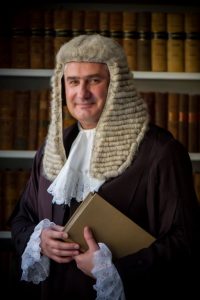Marios Lambis KC – 2 Hare Court, London
 Marios Lambis KC, who grew up in North London the son of Greek Cypriot immigrants, is believed to be the first barrister who specialises entirely in professional discipline (PD) to be appointed silk, following the 2021 KC competition. Marios was originally a criminal specialist (in the chambers of Sir Desmond de Silva KC) and his cases included murders, major frauds and terrorist cases, including the first Iraqi Hijacking trial. One of his most high-profile cases was the tragic killing of ‘Baby P’ in 2010, where he presented the case against the team leader and social worker who failed to keep ‘Baby P’ safe. Marios greatly enjoyed the challenge of defending or prosecuting professionals such as doctors, dentists and teachers, and his practice steadily broadened to encompass professional discipline and regulatory work exclusively, some twenty years ago.
Marios Lambis KC, who grew up in North London the son of Greek Cypriot immigrants, is believed to be the first barrister who specialises entirely in professional discipline (PD) to be appointed silk, following the 2021 KC competition. Marios was originally a criminal specialist (in the chambers of Sir Desmond de Silva KC) and his cases included murders, major frauds and terrorist cases, including the first Iraqi Hijacking trial. One of his most high-profile cases was the tragic killing of ‘Baby P’ in 2010, where he presented the case against the team leader and social worker who failed to keep ‘Baby P’ safe. Marios greatly enjoyed the challenge of defending or prosecuting professionals such as doctors, dentists and teachers, and his practice steadily broadened to encompass professional discipline and regulatory work exclusively, some twenty years ago.
Marios also undertakes advisory work for many organisations, and was, for example, one of only eight lawyers (and the only ‘junior’ barrister) who advised on the new fitness to practice rules for the organisation that was to take over the hearings for the General Medical Council (GMC). Marios has also advised and/or represented the Home Office, multinational enterprises, non-governmental organisations and regulators in a wide range of areas including environmental pollution, health & safety and fitness to practice in various professions. Marios is also a Recorder of the Crown Court with a licence to try and/or hear serious sexual offences and appeals.
Marios has an unusual, probably unique, background for a Kings Counsel at the England and Wales’ bar, not only in terms of his practice area. His parents left Cyprus just after the war and built a happy life for themselves and their family in London. His parents ran successful restaurants and slowly built a property empire. Life, though, was not always straightforward, as Marios’ father had a knack of making things rather “feast or famine.” One week they could feel wealthy, says Marios, “and the next concerned about bailiffs being at the door!” Marios’ father was a tough survivor – he had had to be having lost his own mother when he was just nine years old. When, in the East End of London in 1950s, Marios’ father was approached for ‘protection money’ by a small man who was a gangster working for the infamous Kray twins (who ‘ran’ that part of London into the 1960s), he refused to pay. “As a proud 6ft 3in Cypriot man” he did not want to be embarrassed in front of his family or shame his family name. A few days later some of the Kray twins’ hardmen came back to the restaurant with knuckle dusters and bats and attacked Marios’ father and smashed up the restaurant. He fought back, as did Marios’ mother who, despite being heavily pregnant, hit the hoodlums with her stiletto heels. Several weeks later, Marios’ father helped an old woman in the street who’d been taunted by some young men. It turned out, by pure chance, that the lady was a relative of the Krays, and the order went out that Marios’ father and family were to be left alone and (whether they liked it or not!) were “protected” – and for ‘free’! Marios says there are many such stories, but that one epitomised his parents. “They were honourable and decent but fought like warriors if they had to. It fills me with such pride to be a London-born Cypriot.”
Marios’ parents’ hard work, bravery and tenacity enabled Marios to become the first person in his family to go to university, but his life and outlook remained very strongly rooted within his family and proud British Greek-Cypriot identity. Marios, for example, was expected to work his evenings, weekends and most of his vacations in the family restaurants as he progressed through school, university and bar school. This kept Marios’ feet firmly on the ground! The family always came first, and when his father had a heart attack early on in his career, Marios did not hesitate to take a year out from the bar to help the family with running the businesses. Marios owed everything to his family and the manner in which his parents broke through the barriers presented to them by life and society provided a powerful template for Marios when he decided, in the face of his peers and colleagues’ advice, to step away entirely from his very successful criminal practice, and specialise solely in PD and regulatory work. He knew it would make it harder to achieve his ambition of becoming a silk, but his view was “so be it”. He adored the work, relished its challenges and felt in his bones that it would in time achieve its due recognition as a “substantial” area of law and advocacy. It has also helped, Marios says, that the work has expanded considerably over the years, helping add to its status.
Whilst many eminent practitioners practiced in the area of PD and regulatory work (who were or are now themselves silks), almost all did so as an adjunct to their other practice, be it personal injury, professional negligence, employment or some other major area of law.
PD work, on its own, was not taken as seriously as it should by the wider profession for many years and the feedback that Marios received after his early unsuccessful applications for KC bore this out. It was evident that the (then) newly established KC selection process struggled to ascribe a position or value to the sort of work that specialists in PD and regulatory areas undertook. Indeed, to Marios’ frustration and his Head of Chambers’ anger, Marios’ very first application for KC was returned to him along with his fee. KCA had deemed it not possible for the Selection Panel to assess Marios’ cases and practice area against the scheme’s competencies, and was therefore de facto ineligible. This seemed somewhat anomalous to Marios and colleagues given that practitioners in other ‘atypical’ areas of the bar were regularly successful in the competition, despite rarely appearing ‘on their feet’ in the higher courts of England and Wales. Planning specialists, for example. who also did a different sort of advocacy from the ‘mainstream’, were explicitly included in the (then) new appointments’ process.
Marios’ other early applications were at least accepted and processed by KCA and the Selection Panel, even progressing to interview. But these also came up against the difficulty which the Panel clearly still had in assessing Marios’ advocacy, and concerns about how this might translate to a court setting. The fact that Marios was unable to list more than one or two judges on his application form was also a handicap. The Panel appeared to struggle with calibrating evidence from tribunals and regulatory bodies against that from other ‘normal’ judicial assessors, from which other applicants received from their judicial assessments. This was evident from Marios’ feedback from the Panel. But Marios never wavered from his chosen path or regretted having not applied for silk whilst he still had a substantial proportion of high-level criminal work. Colleagues suggested that Marios should have applied for silk years earlier when he worked solely on crime.
Marios is sanguine about his struggle to have his own qualities as an aspiring silk recognised, but less so in relation to the fate of colleagues in the same specialisms. Others with substantial amounts of PD and regulatory work had probably also been held back, Marios believes. In any case, Marios remained undaunted and unbowed by his early knock-backs and he returned to the fray after taking a few years out from applying for KC. Marios says that his parents’ early life struggles rather put his own battle to achieve silk into proper perspective: After all, his mother and father had faced down the Kray twins! And, as it happened, Marios had no problems at all on his final application for silk in convincing the Selection Panel not only of his own clear-cut excellence at the level of KC, but also the bona fides of his chosen specialism.
Marios did not think he had done well at his interview as he had misunderstood a question regarding diversity from one of the two Panel interviewers. He had to have it repeated. That clearly did not count against Marios. He says the interview was conversational and that the interviewers did their best to put you at your ease. One of the hardest aspects of the competition for Marios was in not being able to approach his judicial assessors as other applicants can, either because he had no ability to contact them or this would not have been professionally appropriate given their roles as chairs of regulatory bodies and disciplinary tribunals. That made it difficult to also get the feedback which other barristers benefitted from, from the judges in their cases, some of whom might be amongst those encouraging a silk application. As Marios puts it, he had to “apply in the dark”.
As to advice to those who are thinking about applying for silk, Marios would counsel very early preparation. You have to start early and think deeply about your cases in relation to the competencies. Do not automatically dismiss your less substantial/important cases as these too could provide valuable examples that demonstrated one or more of the competencies. Marios says, “seek and listen to advice but always follow your own instincts”.
As regards, what advice Marios might give to people interested in a career in advocacy, and those just embarking upon a legal career who aspire to the most senior levels in the profession, he says “always pursue the dream of what you want to be, whatever the challenges”. And “always aspire to be the best and have a goal (such as silk) in your sights”.
Like his parents, Marios broke his own glass ceiling when he achieved KC: “People told me it couldn’t be done, but, together with many other incredible professionals, we’ve built this area of law into what it is today.” Marios hopes that his appointment to KC means that colleagues in his specialism can realistically aspire to becoming silks one day, if they have all the necessary attributes and can demonstrate these to a level of excellence across all the competencies.
- Date: February 14, 2023
- Category:

